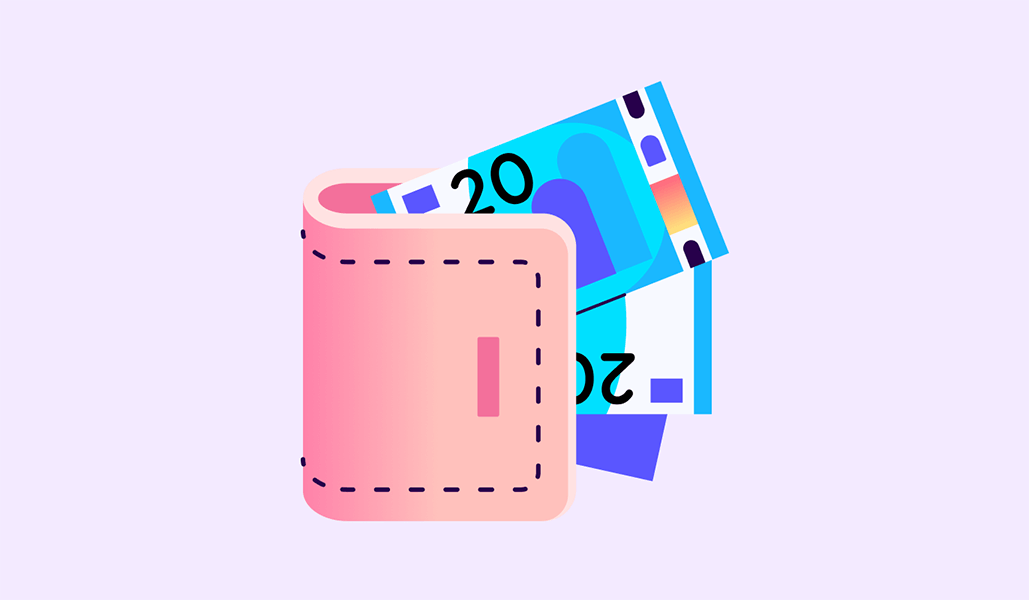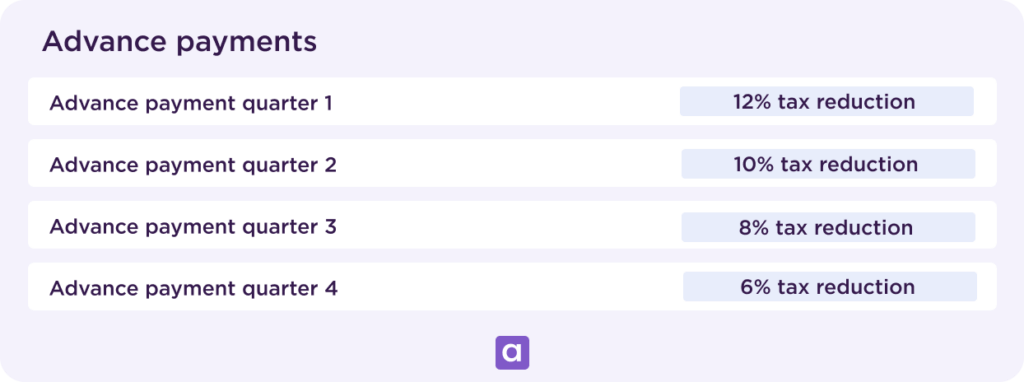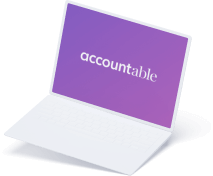
Advance tax payments for the self-employed: how does it work?
Read in 5 minutes
Paying taxes in advance? Admittedly, it’s not the most appealing concept. Technically, these advance payments aren’t mandatory, but failing to make them results in a substantial tax surcharge. In 2024, this surcharge is set at 9% (!), applicable whether you’re a sole trader, a company director, or a supporting spouse.
This marks a significant increase from 2023, when the surcharge for a sole proprietorship was merely 4.5%, and 6.75% for a corporation. It’s certainly time to get to grips with this issue.
Advance tax payments
In essence, the Federal Public Service Finance nearly always implements a tax surcharge, acting as a form of interest on your taxes. This is because without these advance payments, self-employed individuals would end up paying their taxes the following year, while employees have tax deducted from their pay each month.
Viewed as a prepayment on your total tax bill, these advance payments are calculated based on your estimated professional income for the year, similar to the system used for employees.
Fortunately, you can ‘neutralise’ this tax surcharge by making advance payments, with a payment in the first quarter having the most significant effect.

💡Advice from Hassan Ayed, Accountant & Tax Advisor: It is in your best interest to make the largest advance payment, accounting for 75%, in the first quarter.
How do advance tax payments work?
Example 1: 75% advance payment in quarter 1
Suppose you are a sole trader who needs to pay a total of €10,000 in taxes. If you do not make any advance tax payments, the Federal Public Service Finance (FOD) applies a tax increase of 9%. This means you would have to pay an extra €900 in taxes.
Let’s say, in the first quarter, you make an advance payment of 75%. This qualifies you for a tax reduction of 12%.
- Advance payment: 75% of €10,000 = €7,500
- Tax reduction: €7,500 x 12% = €900
In this example, with a 75% advance payment, you have effectively reduced the tax increase of 9% to zero.
Example 2: staggered advance tax payments
It’s quite normal for self-employed individuals not to be able to make a 75% advance payment in the first quarter.
Therefore, you can choose to spread out your advance payments. However, be aware that the tax reduction decreases each quarter, so it is always beneficial to make the largest advance payment in Q1.
- Advance payment for Quarter 1: 50% of €10,000 = €5,000
- Tax reduction for Q1: €5,000 x 12% = €600
- Advance payment for Quarter 2: 20% of €10,000 = €2,000
- Tax reduction for Q2: €2,000 x 10% = €200
- Advance payment for Quarter 3: 10% of €10,000 = €1,000
- Tax reduction for Q3: €1,000 x 8% = €80
- Advance payment for Quarter 4: 5% of €10,000 = €500
- Tax reduction for Q4: €500 x 6% = €30
If you add up the tax reductions in this example, you also reach €900. Thus, you have reduced the tax increase of 9% to zero. However, due to the staggered approach, you had to spend more money to enjoy the same level of tax reduction.
If you have the financial capability, it’s recommended to make the largest advance payment in the first quarter. By doing so, with a total advance payment of €8,500, you have completely neutralized the 9% tax increase.
Of course, you will still need to pay the remaining part of your taxes afterwards, but this way, you avoid any increase.
Example 3: advance payment in the last quarter
If you choose to pay the entire €8,500 in the 4th quarter, this advance payment would only yield a tax benefit of €516. This is insufficient to neutralize the tax increase of €900.
- Advance payment for Quarter 1: €0
- Tax reduction for Q1: €0
- Advance payment for Quarter 2: €0
- Tax reduction for Q2: €0
- Advance payment for Quarter 3: €0
- Tax reduction for Q3: €0
- Advance payment for Quarter 4: €8,600
- Tax reduction for Q4: €8,600 x 6% = €516
💡Note that during the fiscal year, you don’t yet know the exact amount of taxes you will need to pay. Therefore, try to make as accurate an estimate as possible and consider a substantial advance payment in the first quarter, but do not overdo it. Once you have neutralized the tax increase, the benefit ceases. You do not receive a bonus or discount for paying a larger amount in advance.
Of course, if you have overpaid your taxes in advance, you will receive a refund for the difference.
Practical aspects of advance payments
When should you make advance payments?
Here are the final payment dates for each quarter:
- Quarter 1: by 10/04
- Quarter 2: by 10/07
- Quarter 3: by 10/10
- Quarter 4: by 20/12
The funds must be in the government’s account by these dates. Make sure to execute your payment in time, considering weekends and public holidays. Payments made after these dates will count for the next quarter and will have less impact due to the lower reduction percentage.
How do you make an advance payment?
You have two options for making the payment:
- You can pay online via MyMinFin. If the amount is too high, you might encounter payment limits, but these can be increased through your bank.
- Alternatively, you can use a bank transfer, preferably from an account in your own name. Be sure to use the structured communication code for your business, which you can find on MyMinFin.
Bank details:
- Account number: BE61 6792 0022 9117 (BIC: PCHQ BEBB)
- Payable to: ‘Inningscentrum – Dienst voorafbetalingen’
- Address: Koning Albert II-laan 33, 1030 Brussel.
Exceptions to the tax increase
In some cases, you won’t face a tax increase even if you don’t make advance payments. This applies, for instance, to newly established self-employed individuals and small companies that have been operating for less than three years. Additionally, if the increase is less than €100, it is not applied.
If you’re unsure about your situation, contact our Tax Coaches; they are ready to assist you.
However, if you have already made a significant profit in these first three years, it might still be beneficial to make advance payments. This way, you won’t have to pay a large sum of taxes all at once the following year. While this provides peace of mind, unfortunately, it does not yield a tax benefit.
💡Accountable tip: If you have a creative profession and part of your revenue comes from copyright royalties, you won’t have to pay taxes on that portion.
Never overpay on taxes with Accountable
The calculations from the examples above are based on the total tax amount, which you only know after the final settlement. However, you can still accurately estimate how much tax you will need to pay during the fiscal year. If you keep track of your income and expenses in Accountable, the app automatically calculates this for you. Convenient, right?
Accountable is the perfect partner for planning your advance tax payments. The app sends you notifications when advance payment deadlines are approaching, provides payment instructions, and suggests an appropriate amount. It also takes into account your start date, as you don’t need to make advance payments in the first three years.
To use this feature, simply go to the ‘Taxes’ tab and navigate to the ‘Advance Personal Tax Payments’ section, and enter a few details, including:
- Your estimated profit for this year (or you can enter a standard amount)
- Your preference for advance payments: none, gradually throughout the year, or as much as possible at the start of the year (choose the latter if it is financially feasible).
This way, you can easily avoid a tax increase and never pay more taxes than necessary.
What may seem complex, Accountable makes easy for you. This is true for advance payments as well as for your entire accounting. With Accountable, you always have a perfect view of your finances, and you can optimally plan your advance payments. This ensures you never overpay taxes, neither in advance nor afterwards.
Did you find what you were looking for?
Happy to hear!
Stay in the know! Leave your email to get notified about updates and our latest tips for freelancers like you.
We’re sorry to hear that.
Can you specify why this article wasn’t helpful for you?
Thank you for your response. 💜
We value your feedback and will use it to optimise our content.










